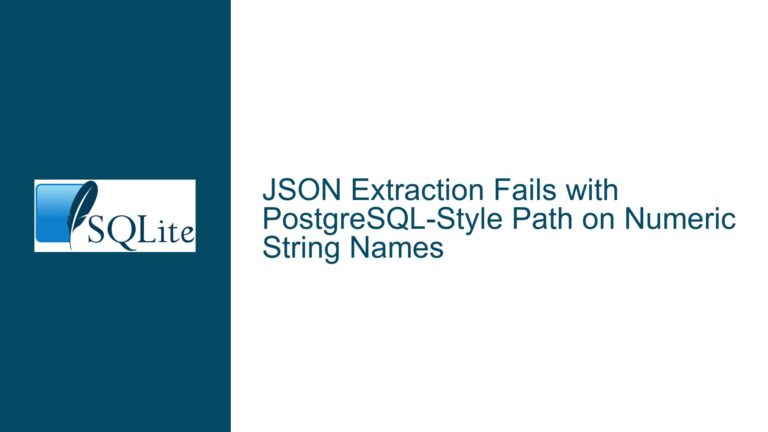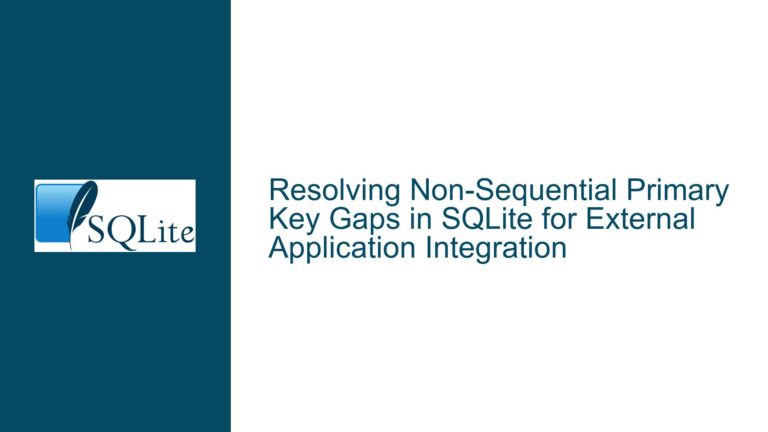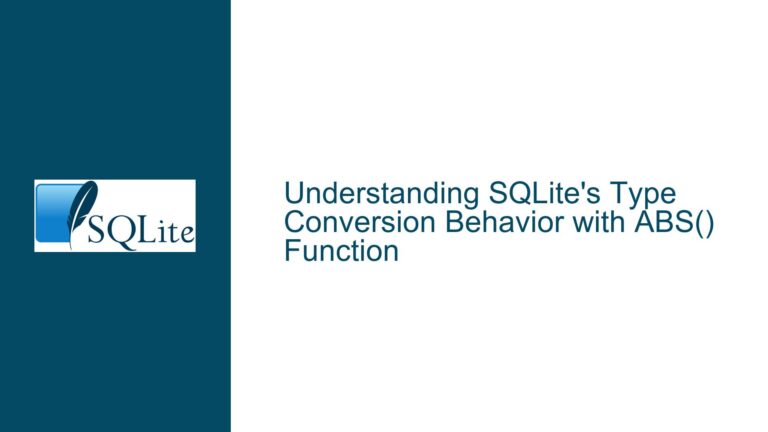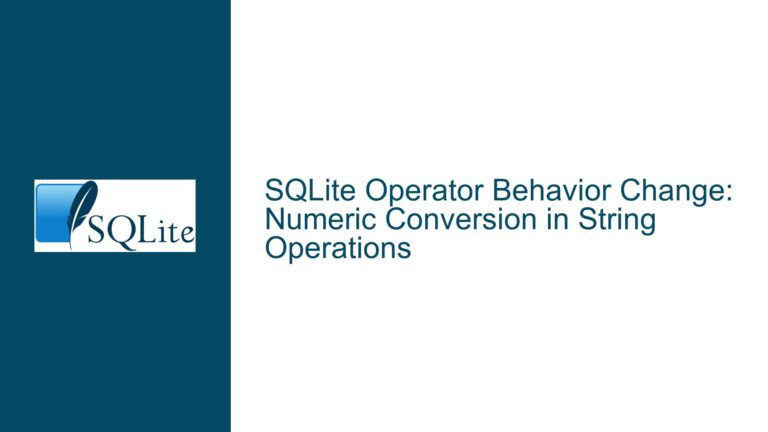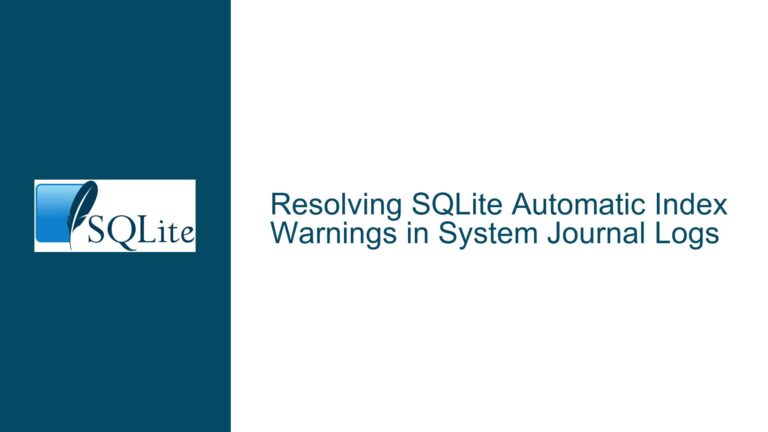SQLite CLI .expert Fails on UPDATE FROM with Generated Columns
Issue Overview: UPDATE FROM Query Fails in .expert Mode Due to Generated Columns
The core issue revolves around the SQLite CLI’s .expert mode failing to analyze an UPDATE FROM query when the target table contains a generated column, even if the generated column is unrelated to the query. The .expert mode is designed to provide index recommendations for queries, but it encounters an error when processing the UPDATE FROM statement. The error message explicitly states: Error: cannot UPDATE generated column "<column name>". This behavior is unexpected because the actual UPDATE FROM query executes successfully without any issues.
The problem manifests when the .expert mode attempts to analyze the query. The generated column, despite being unrelated to the UPDATE FROM operation, triggers the error. This suggests that the .expert mode’s internal logic for parsing and analyzing queries does not handle generated columns correctly in the context of UPDATE FROM statements. The issue has been verified across multiple SQLite versions, including 3.40.1 and the latest trunk check-in, indicating that it is not specific to a particular release but rather a systemic limitation or bug in the .expert mode’s implementation.
The reproduction steps provided in the discussion clearly demonstrate the issue. A target table is created with a regular column (to_update) and a generated column (unrelated). A source table is also created with a single column (from_update). The UPDATE FROM query successfully updates the to_update column in the target table using values from the from_update column in the source table. However, when the .expert mode is invoked to analyze the same query, it fails with the aforementioned error.
This discrepancy between the successful execution of the UPDATE FROM query and the failure of the .expert mode to analyze it highlights a critical gap in the SQLite CLI’s functionality. The .expert mode is a valuable tool for database developers seeking to optimize their queries, and its inability to handle generated columns in UPDATE FROM statements limits its usefulness in scenarios where such columns are present.
Possible Causes: Internal Parsing Logic and Generated Column Handling
The root cause of this issue lies in the internal parsing and analysis logic of the .expert mode. When the .expert mode processes a query, it performs a series of steps to understand the query’s structure and determine potential index recommendations. These steps include parsing the query, identifying the tables and columns involved, and simulating the query’s execution to gather statistics. However, the presence of a generated column in the target table appears to disrupt this process.
One possible explanation is that the .expert mode’s parser incorrectly interprets the generated column as being part of the UPDATE FROM operation, even though the column is explicitly marked as GENERATED ALWAYS and VIRTUAL. This misinterpretation could stem from the way the .expert mode handles column references in UPDATE FROM statements. The parser might be treating all columns in the target table as potential candidates for updates, regardless of whether they are generated or not. This would explain why the error message specifically mentions the generated column, even though it is unrelated to the query.
Another potential cause is the .expert mode’s reliance on SQLite’s internal query planning and optimization mechanisms. When the .expert mode analyzes a query, it likely leverages the same internal APIs that SQLite uses to plan and optimize queries. If these APIs have limitations or bugs related to generated columns in UPDATE FROM statements, the .expert mode would inherit those limitations. This could result in the observed error when the .expert mode attempts to analyze the query.
Additionally, the .expert mode might not fully support the UPDATE FROM syntax, which is a relatively recent addition to SQLite. The UPDATE FROM statement allows for updating a table based on values from another table, and its implementation might not have been fully integrated into the .expert mode’s analysis logic. This could lead to inconsistencies in how the .expert mode handles UPDATE FROM queries, especially when generated columns are involved.
Finally, the issue could be related to the way the .expert mode simulates query execution. When analyzing a query, the .expert mode might attempt to execute a simplified or modified version of the query to gather statistics. If this simulation process does not account for generated columns correctly, it could result in errors. For example, the simulation might attempt to update the generated column, which is not allowed, leading to the observed error message.
Troubleshooting Steps, Solutions & Fixes: Addressing the .expert Mode Limitation
To address this issue, several troubleshooting steps and potential solutions can be explored. The first step is to verify whether the issue is specific to the .expert mode or if it also affects other SQLite CLI features that analyze queries. This can be done by testing the UPDATE FROM query with other analysis tools or commands, such as EXPLAIN QUERY PLAN. If the issue is isolated to the .expert mode, it suggests that the problem lies within the .expert mode’s implementation rather than SQLite’s core functionality.
If the issue is confirmed to be specific to the .expert mode, the next step is to examine the .expert mode’s source code to identify the root cause. The SQLite source code is open and available for review, making it possible to trace the .expert mode’s behavior and pinpoint the exact location where the error occurs. This would involve analyzing the code responsible for parsing UPDATE FROM statements and handling generated columns. By understanding the internal logic, it may be possible to identify a workaround or propose a fix.
One potential workaround is to temporarily remove the generated column from the target table before running the .expert mode analysis. This can be achieved by creating a temporary table that mirrors the structure of the target table but excludes the generated column. The UPDATE FROM query can then be analyzed using the .expert mode on the temporary table. While this approach is not ideal, it allows for obtaining index recommendations without encountering the error. After the analysis is complete, the temporary table can be dropped, and the original table can be used as usual.
Another workaround is to manually analyze the UPDATE FROM query using SQLite’s EXPLAIN QUERY PLAN command. This command provides detailed information about how SQLite plans to execute a query, including the indexes it will use. While it does not offer the same level of optimization recommendations as the .expert mode, it can still provide valuable insights into the query’s performance. By examining the output of EXPLAIN QUERY PLAN, it may be possible to identify potential optimizations or missing indexes.
If modifying the .expert mode’s source code is an option, a more permanent solution can be implemented. This would involve updating the .expert mode’s parsing logic to correctly handle generated columns in UPDATE FROM statements. The fix would require ensuring that the .expert mode recognizes generated columns as read-only and excludes them from the update simulation process. This change would prevent the error from occurring and allow the .expert mode to provide accurate index recommendations for UPDATE FROM queries involving tables with generated columns.
In addition to code changes, it is important to report the issue to the SQLite development team. By submitting a detailed bug report, including the reproduction steps and error message, the development team can investigate the issue and potentially include a fix in a future release. The bug report should highlight the discrepancy between the successful execution of the UPDATE FROM query and the failure of the .expert mode to analyze it, emphasizing the impact on database optimization workflows.
Finally, it is worth considering alternative tools or extensions that provide similar functionality to the .expert mode. While SQLite’s .expert mode is a powerful tool, there may be third-party tools or libraries that offer more robust support for analyzing complex queries, including those involving generated columns and UPDATE FROM statements. Exploring these alternatives can provide a temporary solution while waiting for an official fix from the SQLite development team.
In conclusion, the issue of the .expert mode failing on UPDATE FROM queries with generated columns is a significant limitation that affects database optimization workflows. By understanding the root cause, exploring workarounds, and proposing potential fixes, it is possible to mitigate the impact of this issue and continue leveraging SQLite’s powerful features for query optimization.

